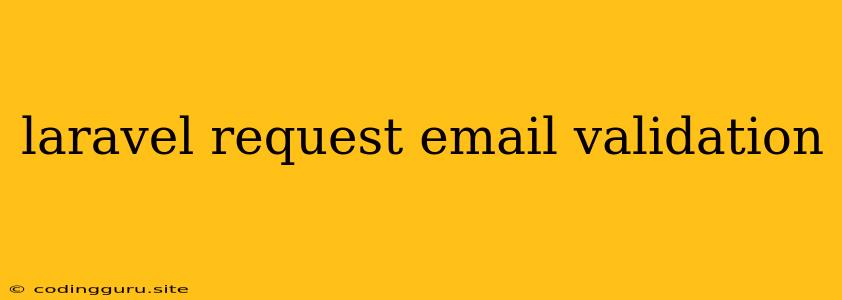Validating Emails in Laravel Requests: A Comprehensive Guide
In the realm of web development, robust data validation is paramount. Laravel, the renowned PHP framework, equips us with powerful tools for validating incoming requests, including email addresses. Ensuring the validity of email addresses is critical for maintaining data integrity, preventing spam, and enhancing the user experience.
Why is Email Validation Essential?
- Data Integrity: A valid email address ensures that communication can be established with users, facilitating essential interactions like password reset instructions, account verification, and promotional updates.
- Spam Prevention: By filtering out invalid or non-existent email addresses, we minimize the risk of spam and malicious activity.
- User Experience: Validating emails upfront prevents unnecessary errors and provides users with clear feedback, enhancing their overall experience.
Laravel's Request Validation: A Powerful Tool
Laravel's request validation system provides a seamless and flexible approach to enforcing data rules. Let's delve into the intricacies of validating email addresses using Laravel's validation rules.
The email Validation Rule
At its core, Laravel's email validation rule checks whether the provided input conforms to a standard email format.
Example:
use Illuminate\Http\Request;
public function store(Request $request) {
$validatedData = $request->validate([
'email' => 'required|email',
]);
// Proceed with saving the user data
// ...
}
In this snippet, the email rule is applied to the email field. If the provided input does not match a valid email format, the validation will fail.
Advanced Email Validation: Beyond the Basics
While the email rule is fundamental, it's often necessary to implement more sophisticated email validation checks. Let's explore some additional validation rules that can enhance our email validation logic:
1. unique: Ensuring that the email is unique within a specific database table (e.g., the users table).
Example:
use Illuminate\Http\Request;
public function store(Request $request) {
$validatedData = $request->validate([
'email' => 'required|email|unique:users',
]);
// Proceed with saving the user data
// ...
}
2. max: Limiting the maximum length of the email address.
Example:
use Illuminate\Http\Request;
public function store(Request $request) {
$validatedData = $request->validate([
'email' => 'required|email|max:255',
]);
// Proceed with saving the user data
// ...
}
3. regex: Implementing custom regular expressions for more tailored email validation.
Example:
use Illuminate\Http\Request;
public function store(Request $request) {
$validatedData = $request->validate([
'email' => 'required|regex:/^[a-zA-Z0-9._%+-]+@[a-zA-Z0-9.-]+\.[a-zA-Z]{2,}$/',
]);
// Proceed with saving the user data
// ...
}
4. confirmed: Requiring the user to confirm their email address by entering it twice (e.g., for registration forms).
Example:
use Illuminate\Http\Request;
public function store(Request $request) {
$validatedData = $request->validate([
'email' => 'required|email|confirmed',
'email_confirmation' => 'required|same:email',
]);
// Proceed with saving the user data
// ...
}
5. exists: Ensuring that the email address exists in a specific database table (e.g., for login forms).
Example:
use Illuminate\Http\Request;
public function login(Request $request) {
$validatedData = $request->validate([
'email' => 'required|email|exists:users',
]);
// Proceed with authentication logic
// ...
}
Customizing Validation Messages
Laravel provides a mechanism for customizing validation error messages. You can define custom messages for specific validation rules.
Example:
use Illuminate\Http\Request;
public function store(Request $request) {
$validatedData = $request->validate([
'email' => 'required|email|unique:users',
], [
'email.unique' => 'This email address is already in use.',
]);
// Proceed with saving the user data
// ...
}
Beyond Basic Validation: Email Address Verification
While Laravel's built-in validation rules provide a strong foundation, you may need to implement email verification to ensure that the email address belongs to a legitimate user.
1. Sending Verification Emails: Upon user registration, send a verification email containing a unique token.
2. Verifying Tokens: When the user clicks the verification link, the token is validated, and the user's account is activated.
Example:
use Illuminate\Support\Facades\Mail;
use App\Mail\EmailVerification;
// ...
public function store(Request $request) {
$validatedData = $request->validate([
'email' => 'required|email|unique:users',
]);
// Create a new user with a verification token
$user = User::create([
'email' => $validatedData['email'],
'verification_token' => Str::random(60),
]);
// Send email verification
Mail::to($user->email)->send(new EmailVerification($user));
// ...
}
Conclusion
Validating email addresses is an integral part of building secure and user-friendly web applications. Laravel's request validation system provides an array of powerful tools for enforcing data integrity, preventing spam, and improving the overall user experience. By combining built-in validation rules, custom logic, and email verification techniques, we can ensure that only valid email addresses are processed, leading to a more reliable and robust application.
